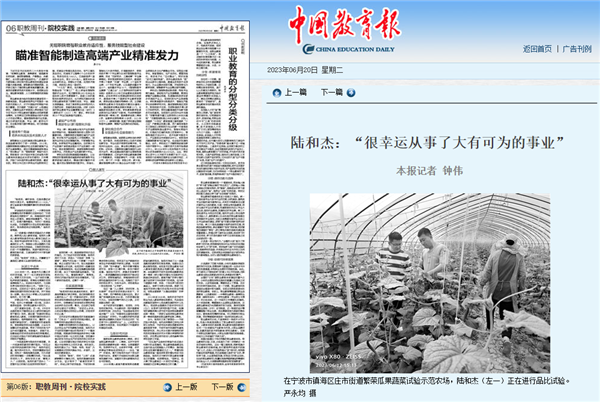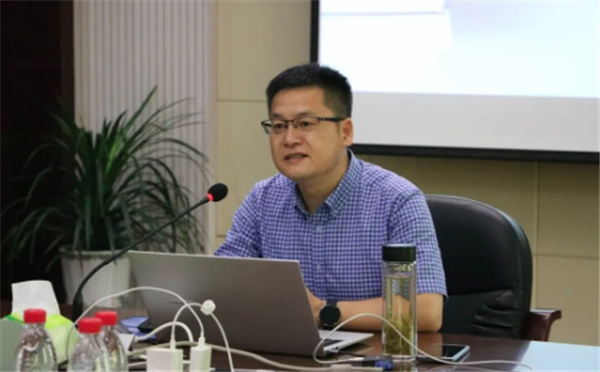 Walking from the dirt
Walking from the dirt


Lu Hejie gives a thematic lecture titled “Lifetime Education Contributes to Rural Revitalisation”
In 2005, Lu Hejie transferred from Tianyuan Elementary School to Tianyuan Adult School to train local villagers. At first he was not taken seriously, but Lu did not feel discouraged. Instead, he was convinced of the prospects for success in developing rural vocational education. It was not blind confidence. The Party Central Committee and State Council had proposed to “develop vocational and adult education in rural areas, and carry out skills training for the rural labour force on a widespread scale so as to cultivate and foster new farmers who are cultured, skilled and have business savviness.” Taking into account the reality on the ground in Cixi, Lu quickly realized the importance of cultivating new farmers. In particular, rapid industrialisation and urbanisation had combined to diminish land for farmers while necessitating the need for an industrial upgrade. There were also farmers who were slightly old in age, lacked skills and relied on traditional and inefficient farming methods. This made it difficult for them to meet the needs of production while marketing new, high value-added crops.
With national policies on Lu’s side and his observations at the grassroots, Lu was motivated by a sense of compassion and care for the farmers. Since then, he has been determined to make an impact and transform lives. “I will do whatever I can to improve farmers’ living conditions,” he said. “I was also a son of farmers and I understand how difficult life can be for farmers when their income is too low."
The first step on Lu’s journey was to eliminate farmers’ prejudice against him. To narrow the gap between farmers and himself, Lu tried to talk to them in down-to-earth and plain language, picking and tasting fruit with them. He also reached into his own pockets to establish vegetable greenhouses where he grew new varieties of tomatoes. “Let me compete with you and see who will grow better tomatoes,” he said. After witnessing the results first-hand, the farmers came to respect him. “The newcomer Lu,” they declared, “is really special.”
Exploring through practice
“Since you’re a friend of Lu, you’re also my friend. How could we have earned such high incomes from farming without him leading us to better understand our crops?” said Old Zhang, a farmer and student of Lu, in an interview with the press. Pushing sugar cane planted by his own family into the hands of a reporter, he invited them to taste the sugarcane that had been cultivated in a chicken garden. Afterwards, the reporter could not help but dish out praise. “In all the years of my career, I’ve never seen such intense enthusiasm from farmers and such high praise for a teacher.”
The topic of the interview was “three-in-one,” a new training model for the farmers developed by Lu and put into practice in Cixi. Old Zhang was only one of the farmers to benefit from the model.
With increasing exchanges between the group of farmers, and sharper awareness and insights into agricultural production, Lu developed a comprehensive understanding of how to centralize training for farmers. Throughout the process, three serious contradictions had to be solved. First, there was a contradiction between the diversity of crops grown by the farmers and the content of their training. Second, there was a contradiction between the centralized training schedule and the period of agricultural production. Finally, there was a contradiction between the diverse requirements needed from the farmers and their simple training and practices. In response to these problems, Lu proposed an all-round, multi-level, “three-dimensional” training programme by incorporating the “computer, TV and phone”.
In the early 21st-century, it was still uncommon for farmers to have access to computers or the Internet, but Lu managed to build a networked training platform. He designed and produced the “Cixi Farmers’ Learning Network,” with links to the official websites of the Ningbo Committee for Agricultural Economic Affairs and the Ningbo Academy of Agricultural Sciences. This allowed farmers to take specialist online courses through a shared database, without leaving the comfort of their home. “Air Classroom” was also launched to produce specialized TV programmes on agricultural affairs and relevant VCDs for farmers to review at any time. During critical moments, for example typhoons, outbreaks of plant diseases and pests, the farmers were messaged information on how to best prepare. Learning teams, organised according to criteria such as geographic proximity and similarity in cropping patterns, were also established to promote exchanges and cooperation. This aided the emergence of “local experts” trained in farming skills.
Under the “all space-time training system” for farmers who aspire to learn anytime and anywhere, interactions and interconnections have been achieved among different platforms, experts and farming households. This has helped to promote the cultivation of new varieties of crop on the farmland, totalling 2,690 mu. In turn, it has also increased farmer’s income by ten million yuan. As a result, the morale of farmers has been greatly boosted, and the villages invigorated.
The Central Bureau of Educational Sciences (now called the China National Academy of Educational Sciences) has evaluated the project. “It should be gradually implemented in rural areas across the country,” they said, “and publicised to the international community as a successful experience.” They have praised the project for its foresight, pragmatism, exemplariness and operability. Lan Jian, a researcher from the Central Bureau of Educational Sciences, also made a speech about the project at the “International Seminar on Community Learning Centres,” citing it as a major achievement of China’s new rural development and an example the world can learn from.
Keeping up with the times
In 2009, after transferring to the Teaching and Research Office’s Education Bureau in Cixi, Lu switched from being a grassroots teacher into a researcher. He departed from a micro-perspective, and began to observe problems and propose solutions from the angle of vocational and urban education development at the city level. His paper, “Theoretical and practical research on the Credit Bank,” was awarded first class prize for vocational and adult education by the Ningbo Municipal Government. The Credit Bank was applied across Cixi, under the principles of universal education and lifelong learning, on the condition that students are provided with convenient, flexible and individual learning support by tying learning to credits. It also explored how to establish community credit banks for residents as well as the appropriate running model. As a result, the first credit bank in China went from being “an idea to its implementation.”
From 2013 to 2020, Lu served as chief of the Adult Education Service and Guidance Centre and the Adult Education Development Research Centre, while working at the Ningbo Vocational and Adult Education School. He facilitated the establishment of the UNESCO CLC Institute for Lifelong Learning Research in Ningbo. The project he wrote won three first-class awards for teaching results in vocational and adult education, granted by the Ningbo Municipal Government. It also won one first-class award for teaching results in vocational education, granted by the Zhejiang Provincial Government, and one national second-class award for teaching results in vocational education.
Now, Lu has assumed a new role as a famous teacher at Ningbo Open University where he educates students on the upgrading of the industrial structure and the comprehensive advancement of rural revitalisation. Vocational education is one of the key drivers in meeting the social demand for skilled talents in all kinds of industries, as well as promoting economic and social development. With the accumulation of theoretical knowledge and practical experience along with his career in the field of vocational education, Lu has developed his own understanding of vocational education for the current period. “I’m lucky to have entered the field of vocational education and to be engaged in a promising career,” he said, with compassion welling deep from his heart. “And I’ll continue contributing my share to the cause.”
Reprinted from China Education Daily by OUC News Network